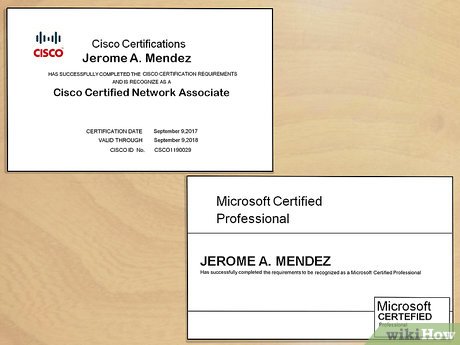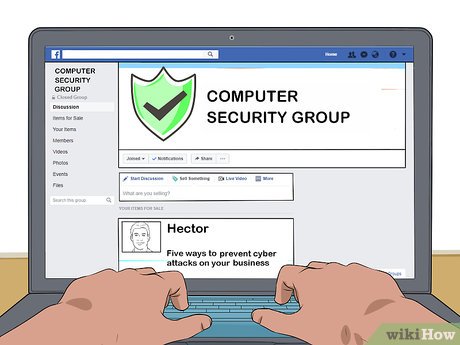How to Become a Computer Security Consultant
Part 1 of 3:
Getting the Necessary Training and Qualifications
-
 Take technology-related classes. Take classes offered at your school that focus on technology and computer science. Enroll in computer programming, physics, and chemistry classes, and take as many math classes as possible.
Take technology-related classes. Take classes offered at your school that focus on technology and computer science. Enroll in computer programming, physics, and chemistry classes, and take as many math classes as possible.- This is an especially helpful first step if you are a high school (or younger) student interested in pursuing a career in computer security.
- You can even try to take Advanced Placement (AP) courses to help put you ahead when you reach the college level.
-
 Join a computer club at your school. Most high schools and junior highs have some kind of computer club that students can join and participate in. This is a great way to start developing your more advanced experience with computer technology, and it will also look good on your college application.
Join a computer club at your school. Most high schools and junior highs have some kind of computer club that students can join and participate in. This is a great way to start developing your more advanced experience with computer technology, and it will also look good on your college application.- You might even consider joining the robotics club at school for more experience with how technology and machinery can be integrated in the real world.
-
 Complete an information technology degree. Most computer security experts are now pursuing a bachelor's degree in a computer or IT-related major. Focus on choosing a high-quality program with the most up-to-date information on computer programming, networking, information systems, penetration testing, and systems analysis.[1]
Complete an information technology degree. Most computer security experts are now pursuing a bachelor's degree in a computer or IT-related major. Focus on choosing a high-quality program with the most up-to-date information on computer programming, networking, information systems, penetration testing, and systems analysis.[1]- For some computer security positions, it's possible to get your foot in the door with an associate's degree accompanied by many years of experience as a substitute for a bachelor's degree. With an associate's degree, you'll spend less time and money on your education. However, you may have to start out at a lower entry-level position if you don't have a bachelor's degree.
- Make sure you choose a program that values innovation and aims to teach student the most relevant and useful information.
- Talk to your high school teachers and guidance counselors for help on finding a college with programs that fit your interests.
- To get an idea about your prospective university's stance on these issues, consider reaching out to a current professor in a technology-related department to ask what they think about the value the university places on innovation.
-
 Get a Master's degree. Consider getting a Master's degree in computer sciences, IT systems, or even engineering. This is especially helpful if you have an undergraduate degree in an unrelated field, but it will also set you apart from the rest of the job hunters who have only a bachelor's degree or lower. This will give you the conceptual and theoretical background necessary to qualify you to work as a computer security consultant.
Get a Master's degree. Consider getting a Master's degree in computer sciences, IT systems, or even engineering. This is especially helpful if you have an undergraduate degree in an unrelated field, but it will also set you apart from the rest of the job hunters who have only a bachelor's degree or lower. This will give you the conceptual and theoretical background necessary to qualify you to work as a computer security consultant. -
 Seek professional certifications. Microsoft (MCSE), Cisco (CCIE), and other companies provide training and certification programs. Any consultant should be able to show a high level of certified training, as it will improve your chances of getting contracts. You can get many of these certifications by taking online training modules with accompanying exams. There are also many testing centers (often operated by Google or Microsoft) that facilitate these types of certifications.[2]
Seek professional certifications. Microsoft (MCSE), Cisco (CCIE), and other companies provide training and certification programs. Any consultant should be able to show a high level of certified training, as it will improve your chances of getting contracts. You can get many of these certifications by taking online training modules with accompanying exams. There are also many testing centers (often operated by Google or Microsoft) that facilitate these types of certifications.[2]- Some certifications are free, while others can cost anywhere from $200-2000 USD, depending on whether you just take the exam, or if you take the accompanying training course.[3]
- Training courses typically last between one day and several weeks, varying between each certification.
- Other useful certifications include: Certified Information Systems Security Professional (CISSP), Certified Ethical Hacker (CEH), ITIL, Certified Information Security Manager (CISM), SANS GIAC, Certified Information Systems Auditor (CISA), Project Management Professional (PMP), Certified Business Continuity Professional (CBCP), Certified Protection Professional (CPP) and Certified Information Privacy Professional (CIPP).
-
 Join a professional computer security organization. Local chapters of these kinds of professional organizations can help you join study groups, forums, and conferences. They can also help enhance your résumé and your expertise. Professional organizations are usually located in most larger cities, but function on a regional/national (or even international) level, which means that members can live anywhere and still participate.[4]
Join a professional computer security organization. Local chapters of these kinds of professional organizations can help you join study groups, forums, and conferences. They can also help enhance your résumé and your expertise. Professional organizations are usually located in most larger cities, but function on a regional/national (or even international) level, which means that members can live anywhere and still participate.[4]- To locate such organizations, try talking to other professionals in your field, reading respected journals in the field of computer technology, or searching around on the internet for groups to join.
- Two of the biggest organizations in the field are the Information Systems Security Association and the American Society for Industrial Security.
- Most organizations like this cost about $200 USD to join for an annual membership fee, though they often have discounts for students and retirees.
Part 2 of 3:
Building Up Experience
-
 Seek a computer security internship while you are still in college. You should begin building your work experience as soon as possible. Even graduates with excellent grades are expected to have some experience in the field before employers will hire them. Internships are a great way to do that.
Seek a computer security internship while you are still in college. You should begin building your work experience as soon as possible. Even graduates with excellent grades are expected to have some experience in the field before employers will hire them. Internships are a great way to do that.- Most IT schools will have connections to internship programs, or you can find them via an online search.
-
 Apply for an entry-level IT job. A well-trained graduate should be able to break into the field fairly easily. Joining an IT department for approximately 2 to 5 years will give you excellent knowledge about security threats and business structure.[5]
Apply for an entry-level IT job. A well-trained graduate should be able to break into the field fairly easily. Joining an IT department for approximately 2 to 5 years will give you excellent knowledge about security threats and business structure.[5]- Some examples of entry-level IT jobs include IT Assistant, IT Specialist, IT Engineer Intern, Information Security Engineer, and Junior System Administrator.
- You do not need to gain a job in IT security right away. Other jobs, like network administrator, are excellent stepping stones for a computer security career.
-
 Prepare for your interview. If you want to get a job in the IT field, you'll need to spend some time preparing for your interview. Think about why you want to get a job in this field and come up with a concise answer. Be prepared to discuss your previous work experience and specific skills that will help you excel in the job position.
Prepare for your interview. If you want to get a job in the IT field, you'll need to spend some time preparing for your interview. Think about why you want to get a job in this field and come up with a concise answer. Be prepared to discuss your previous work experience and specific skills that will help you excel in the job position.- Make sure to prepare a résumé that is tailored specifically for an IT job. Highlight any training certifications, technology classes, or experience in a related field.
-
 Vet your IT jobs well. Like most computer-based fields, there are a number of fraudulent and short-lived companies. Make sure you do your research to avoid these companies, which could mar your resume to prospective clients.
Vet your IT jobs well. Like most computer-based fields, there are a number of fraudulent and short-lived companies. Make sure you do your research to avoid these companies, which could mar your resume to prospective clients.- Some common signs of fraudulent or risky IT companies include only being operational for a short period of time, evidence that the company operated under a different name previously, or high internal employee turnover.
- When gaining experience in the field, try to choose companies with a good reputation in the industry that have been around for several years.
Part 3 of 3:
Furthering Your Career as a Computer Security Consultant
-
 Develop your skillset. Learning about database repair, client support, networking protocols, programming, and computer maintenance will allow you to take more contracts when you become a consultant. Volunteer to work on projects that push you outside of your comfort zone. Look for opportunities to improve and increase your mastery of different aspects of the field.
Develop your skillset. Learning about database repair, client support, networking protocols, programming, and computer maintenance will allow you to take more contracts when you become a consultant. Volunteer to work on projects that push you outside of your comfort zone. Look for opportunities to improve and increase your mastery of different aspects of the field.- Don't be afraid to branch out and try to develop new skills. This will help make you a more valuable employee.
-
 Position yourself for promotions. Stay on top of your assignments and go the extra mile when it comes to your work. Showing your superiors that you are a reliable, knowledgeable employee will help you get the promotion you deserve.[6]
Position yourself for promotions. Stay on top of your assignments and go the extra mile when it comes to your work. Showing your superiors that you are a reliable, knowledgeable employee will help you get the promotion you deserve.[6]- As you move up the ladder gaining new experiences in your job, you will accumulate a more impressive work history that will eventually allow you to branch out into your own consulting firm.
-
 Conduct your own research on new security threats and methods. Study IT forensics, software safety, virus protection, firewall management, and other topics whenever possible to prove you are an expert that can deal with a wide variety of problems.
Conduct your own research on new security threats and methods. Study IT forensics, software safety, virus protection, firewall management, and other topics whenever possible to prove you are an expert that can deal with a wide variety of problems.- You should continuously read information in your field to stay up-to-date on new security threats as they emerge. Read articles online from reputable websites, and subscribe to computer security journals and magazines – like Computers & Security or the Journal of Computer Security.
- Conducting research shows that you are a self-starter, an independent worker, and in tune with the trends in the field of computer security.
-
 Launch a computer security consulting firm. Starting your own security consulting firm will allow you to be your own boss, choose the customers and accounts you work with, and keep a larger portion of the profit you receive from the work that you do. Write a business plan that will detail the number of employees you will need and the services you will offer. Make sure to spend time setting prices based on your expertise and competitors.[7]
Launch a computer security consulting firm. Starting your own security consulting firm will allow you to be your own boss, choose the customers and accounts you work with, and keep a larger portion of the profit you receive from the work that you do. Write a business plan that will detail the number of employees you will need and the services you will offer. Make sure to spend time setting prices based on your expertise and competitors.[7]- Market your company to businesses and professionals. Start to build up a list of clients. Although this may take some time, you will start to get business based on the relationships you build with companies.
-
 File your business documents with the Secretary of State. You will need to file a business structure (sole proprietorship, partnership, corporation, etc.) to complete your company registration. You'll also need to file a fictitious name certificate and employer identification number for tax purposes. You will also need business licenses to start an office in your county/city.[8]
File your business documents with the Secretary of State. You will need to file a business structure (sole proprietorship, partnership, corporation, etc.) to complete your company registration. You'll also need to file a fictitious name certificate and employer identification number for tax purposes. You will also need business licenses to start an office in your county/city.[8]- Call your Secretary of State and County Clerk offices to inquire about the necessary documents in your area.
- If you live outside of the United States, you should check in with your local chamber of commerce to find out what processes must be completed before you can create your own consulting company.
-
 Attend relevant conferences. One of the best ways to stay current in the field of computer security is by attending annual conferences. There are many conferences around the world held each year with the goal of advancing the field and sharing knowledge with attendees.[9]
Attend relevant conferences. One of the best ways to stay current in the field of computer security is by attending annual conferences. There are many conferences around the world held each year with the goal of advancing the field and sharing knowledge with attendees.[9]- All conferences cost money to attend because the conference hosts have to pay for accommodations, speaker fees, equipment, and other costs of running a conference. Some conferences cost around $100 USD to attend, while others can cost over $2000 USD. Make sure you check the price ahead of time.
- Some of the most important conferences in the field include the SANS conferences, InfoSec World conferences, ShmooCon, and the IAPP Global Privacy Summit.
-
 Engage on social media. Another great way to stay connected in the field of computer security is by engaging with other likeminded individuals on various social media platforms. There are many groups on sites like Facebook that allow members to share information.
Engage on social media. Another great way to stay connected in the field of computer security is by engaging with other likeminded individuals on various social media platforms. There are many groups on sites like Facebook that allow members to share information.- This means that you can learn about new security developments or threats in real time, rather than waiting for information to be published online.
- You can also connect to people from different parts of the world, or from other companies, that you might not otherwise have the opportunity to interact with.
- Using social media is also a great tool to use in promoting your business – especially Twitter and Instagram. On platforms such as these, you can share photos, links, and information about your business to a wide group of people.
Share by
Micah Soto
Update 24 March 2020
















